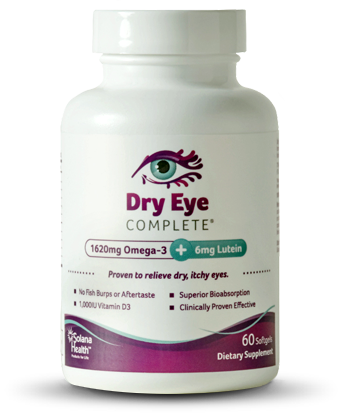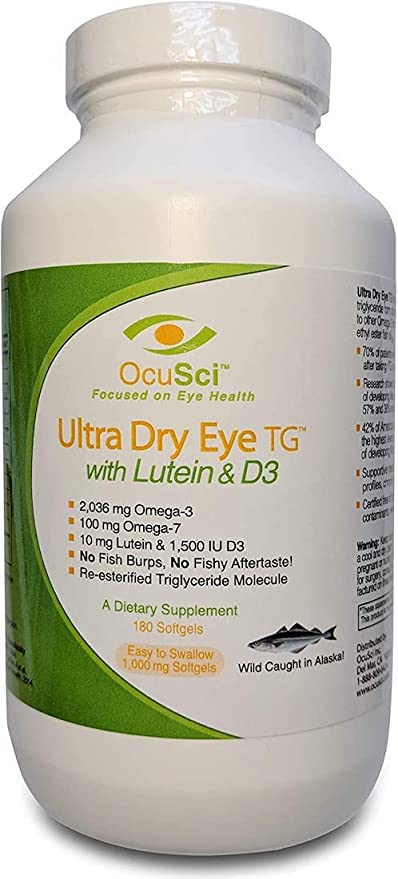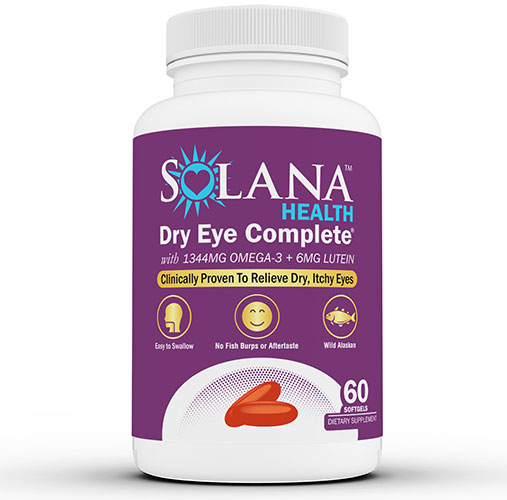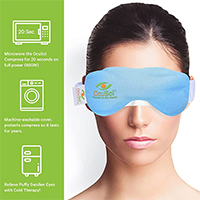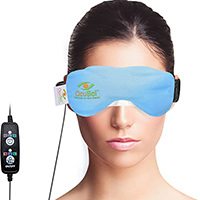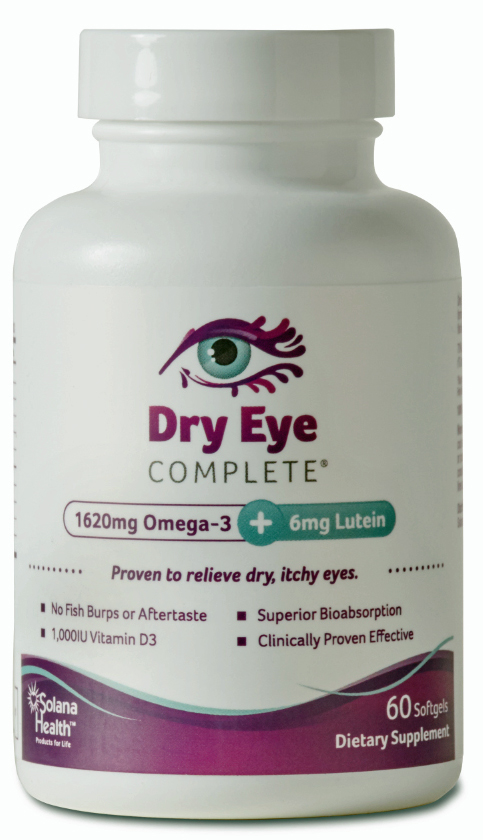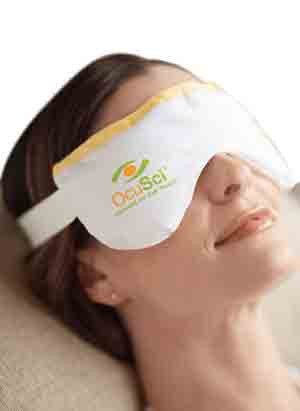Dry eye syndrome (DES) is a very uncomfortable condition. Unfortunately, it is also usually chronic and gets progressively worse. While it almost never leads to permanent loss of vision, it can significantly decrease someone’s quality of life. Fortunately, there are numerous treatment options available for DES, and more and more people are now also looking into whether there are any benefits to taking vitamin supplements.
The jury is still out on whether supplements can have any positive effect on dry eyes. However, supplements most certainly do improve overall health, which means that they certainly will not have a negative effect either. Further research is being conducted to determine whether certain types of supplements do or do not have specific DES benefits, and fatty acids (omega-3) have so far been shown to be the most promising.
Which Dry Eye Vitamins Currently Exist?
More and more supplement manufacturers are creating products targeted specifically at dry eye. One reason for this is because LASIK surgery is becoming more mainstream, and almost everybody who has LASIK will also suffer from DES in the first six months after their treatment. At the same time, however, not all the supplements that exist have proven benefits, and they certainly aren’t all created equally. It is also very important to understand that certain supplements counteract other types of medication. Hence, you should never self-medicate on supplements without first seeking medical advice.
The table below highlights some of the supplement brands that are available.
| Brand | Description | Pros | Cons |
| BioTears |
|
|
|
| TheraTears |
|
|
|
| HydroEye |
|
|
|
| Hydrate Essential | Contains various nutrients and fatty acids. | Old formulation. | |
| Flaxseed oil |
|
Contains omega-3 and omega-6 | |
| Evening primrose oil | Readily available | Contains omega-6 | Insufficient evidence to suggest this is beneficial, but people swear by it. |
| Fish oil |
|
Contains omega-3 | Not suitable if you take aspirin or other anticoagulant medication due to risk of bleeding. |
| Vitamin A (beta-carotene) | Readily available | Best for people with vitamin A deficiency. |
|
| Ionic minerals | Contain salts, minerals and other elements to help improve hydration. | Most people do not like the taste. |
Let’s take a look at some of these treatment options in greater detail.
Flaxseed Oil
Flaxseed oil is an excellent source of omega-3, something most people have a deficiency of. Its nutritional value can easily be destroyed by oxygen, heat and light. As a result, any supplements must be kept in the refrigerator in order to remain effective. Most people, therefore, prefer to use natural flaxseed oil in their cooking, or to add flaxseeds themselves to their breakfast.
Omega-3
While flaxseed oil is believed to be the best source of omega-3 specifically for dry eyes, the fatty acid can also be found in a range of other sources. Fatty fish, for instance, are an excellent source, and there are also many omega-3 supplements that are more stable than flaxseed oil supplements. Additionally, they are backed by significant scientific research that suggests it helps to stimulate tear production and to reduce inflammation in the Meibomian glands, which is often a cause of dry eye syndrome in many people. Unfortunately, some people don’t respond well to omega-3 supplements, as they cause a fishy taste in the mouth and, at times, nausea. This is why it is advisable to obtain omega-3 through diet, including fish like mackerel and salmon, and various nuts like walnuts.
Dry Eye Complete
- Clinically Proven to Relieve Dry Eyes
- 1620mg Omega-3, 6mg Lutein, 1,000IU Vitamin D3
- Sourced from highly sustainable fisheries: wild caught Nordic sardines and anchovies
- 100% All Natural, Non GMO, Gluten Free, Dairy Free. Tested & Certified Free of Contaminants
- NO fish burps or aftertaste guaranteed
- Optometrist Recommended!
- Consumption of Omega 3 is recommended by American Eye Institute.
- Great for MILD & SEVERE dry eye
Ionic Minerals
Ionic minerals are designed to help the body hydrate properly. Ionic mineral supplements are known as ‘full spectrum salts’ and they are designed to make sure the fluid balance in the body is adequate. The supplements should be dissolved in a glass of water once per day. Unfortunately, many people do not enjoy the taste, as it is quite salty. Simply drinking sufficient water (8 to 10 glasses per day, more in hot climates), will also keep you hydrated.
Vitamin A
It is known that if people suffer from vitamin A deficiency for prolonged periods of time, this can mutate the cells in the cornea, leading to xeropthalmia, which is a form of dry eye. Taking a vitamin A supplement is generally not classed as effective, as far higher dosages will be required and it is not possible to self-medicate with this due to potential toxicity of vitamin A. However, prescription eye ointments with vitamin A included in them can be beneficial according to researchers at the University of Michigan Kellogg Eye Center.
Other Vitamins and Minerals
Some vitamins and minerals that some people believe to be beneficial, although scientific evidence is not yet available, including:
- Evening primrose oil, as it contains fatty acids.
- Bioflavonoids, as it can help the body to heal from inflammation and other infections.
- Glucosamine and chondroitin sulfate, which preliminary research has shown to be highly effective in the treatment of dry eye syndrome.
Precautions
Because vitamin supplements are readily available, we have a tendency to self-medicate. This is never a good idea, however. Firstly, it is very easy to overdose on a certain vitamin, for instance, if you take a multivitamin supplement while also taking a specific vitamin on its own. Secondly, many vitamin supplements interact with other types of medication. This is why it is very important that you always speak with a medical professional first. This is also true because your dry eye syndrome may be caused by a different underlying condition, including one of many autoimmune disorders.
Resources and References:
- Nutrition and the Eye – Effects of nutrition on eyesight. (RNIB)
- Dry Eye – Information on dry eyes. (Natural Eye Care)
- Nutritional Therapy for Dry Eye Syndrome – Nutritional treatment for dry eyes. (NTP Talk)
- Nutritional Supplement Stimulates Aqueous Tear Production – Nutrition and dry eyes. (High Beam Research)

